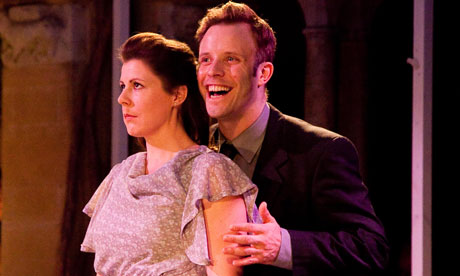
Handel's Rodelinda, regarded as one of his three greatest operas, finds an ideal setting in Iford's Italianate cloister. The plot derives from Pierre Corneille's 1652 play Pertharite, Roi des Lombards. After the downfall of Bertarido, missing presumed dead, the audience eavesdrops on the power struggle for the throne of Lombardy and for the hand of Queen Rodelinda. With Christian Curnyn's conducting so vibrantly alive to every nuance of Handel's score, there was an immediacy to the action that was wholly involving.
Martin Constantine's staging is grey and stark, allowing an undercurrent of violence, verging occasionally on the sadistic, to colour the drama. Crucially, he adds narrative detail to every repeat of the da capo aria and, with a strong cast delivering the long succession of showy arias with considerable passion and authority, the effect was potent. In particular, Constantine gambled with the role of Flavio, young son of Bertarido and Rodelinda (played with remarkable poise by Yves Morris), fleshing it out to make the boy both witness and subject to appalling events. It points to enduring psychological damage, and the happily-ever-after ending is indeed shockingly subverted.
Gillian Ramm was suitably regal in the title role, if a bit too stiff-upper-lipped, and the stunning duet where she is reunited with her husband, the heroic James Laing, was a high point. As the counsellor Unulfo, Owen Willetts was rich-toned, while Doreen Curran's Eduige offered a well-focused portrayal, reflecting the conflicting loyalties of Rodelinda's sister-in-law. But it is the outstanding playing of Curnyn's Early Opera Company orchestra that underpins the evening, dynamic and heart-rending and as fresh as if Handel had composed it last week, not almost 300 years ago.

